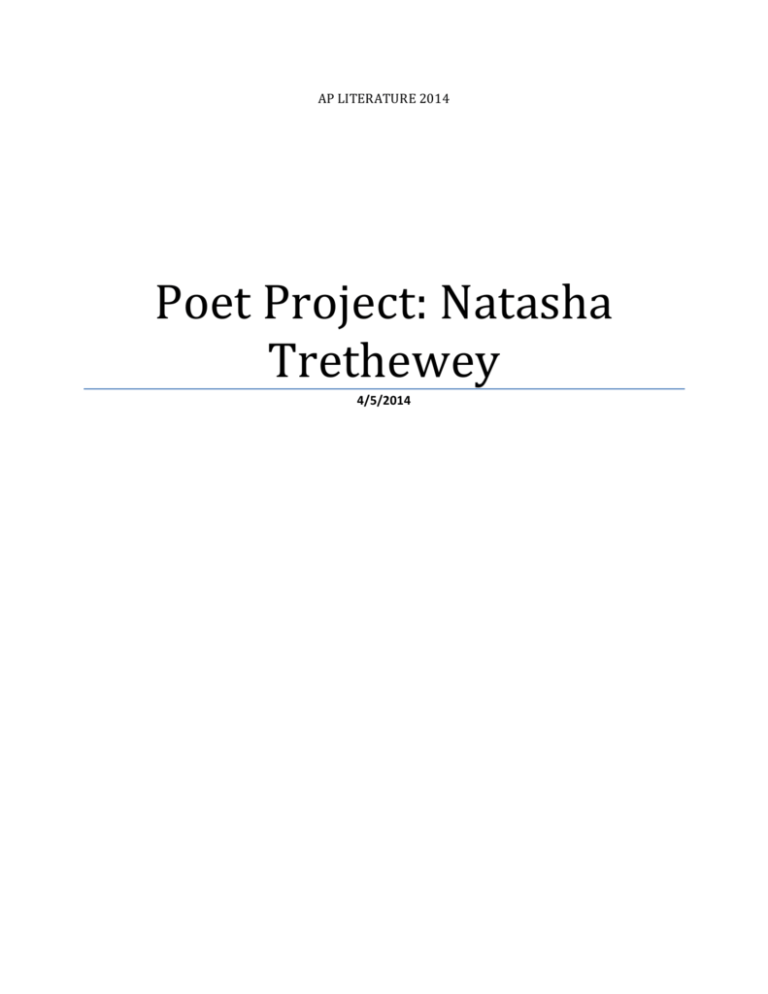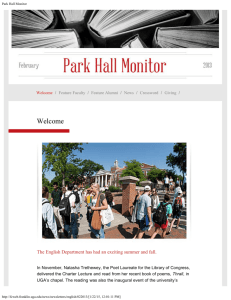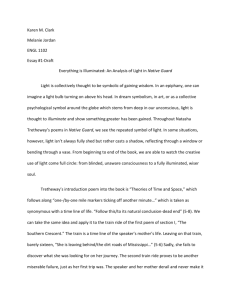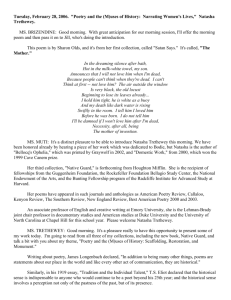Poet Project: Natasha Trethewey
advertisement

AP LITERATURE 2014 Poet Project: Natasha Trethewey 4/5/2014 Natasha Trethewey Natasha Trethewey was born in Gulfport, Mississippi on April 26th, 1966 (on Confederate Memorial Day, “100 years to the day after that holiday was invented”), to a “colored” mother and Caucasian father whose marriage was considered illegal due to the laws of the time which prohibited marriages between different races (McGrath, NY Times). The family was criticized for this marriage; Trethewey recalls one such form of criticism occurred in the early 60’s, when the Ku Klux Klan burned a cross in her family’s yard (Solomon, NY Times). Her father Eric Trethewey encouraged a young Natasha to write poetry when she was bored, kindling a fondness for expression through writing from an early age. Her parents divorced when she was young, and she moved to Atlanta, Georgia with her mother soon after. Her mother remarried after, but divorced again due to her husband’s abusive nature; one year later, he returned and murdered his ex-wife; Trethewey addresses both the abuse and her mother’s death in Native Guard. Trethewey earned a B.A. in English from the University of Georgia, a Master’s Degree from Hollins University (where her father is currently a professor of literature) in English and Creative Writing, and another Master’s Degree in poetry from the University of Massachusetts Amherst (The Boston Globe, Wilson). She won the Pulitzer Prize in Poetry in 2007 for her anthology Native Guard, and was named Poet Laureate of the United States in 2012. Trethewey currently teaches English at Emory University in Georgia along with her husband. She currently resides in Decateur, Georgia (Library of Congress). Natasha Trethewey’s poems are characterized by her use of free verse as well as traditional forms such as sonnets, and resonating memories of her childhood and mother, grief, and pride for her own heritage. Through the use of apostrophe, repetition, and her masterful command of vocabulary and knowledge of connotation, Trethewey effectively communicates her thoughts about such topics as death and loss, childhood, and heritage, and gives tremendous insight into the resilient powers of the human mind in overcoming struggles. Trethewey’s poems “Graveyard Blues” and “Myth” pay tribute to the memory of her mother, and display her lasting grief and sorrow at her mother’s death through their use of unconventional forms, apostrophe, and somber diction. (see handout) This poem is a prime example of Trethwey’s frequent use of free verse and unusual forms in her poems; it mirrors itself, beginning in the separation between lines 9 and 10. The repetition of the lines, combined with the apostrophic calling out from Trethewey to her dead mother enhances the poem’s sense of grief and futility, reinforced by such lines as “You’ll be dead again tomorrow” and “Again and again, this constant forsaking”. The word “Erebus” in lines 4 and 16 alludes to biblical and Greek mythology, and refers to the idea of a “limbo” or inbetween place between life and death or hell; a sort of limbo or gray area; a place between sleeping and waking, where Trethewey holds captive memories of her mother. (see handout) Though this is also about Trethewey’s mother, its form and tone differs greatly from “Myth”. “Graveyard Blues” is similar in form to the traditional Shakespearean sonnet, but utilizes four end-rhyming tercets and a couplet rather than the traditional three quartets and couplet. The first two lines of each stanza repeat themselves indirectly (they say the same thing, though with different phrasing—“When the preacher called out I held up my hand; when he called for a witness I raised my hand”). Trethewey’s development of the mood through the weather greatly impacts the way that the reader perceives the tone of the poem. At the opening of the poem, she remarks upon how it rained “the whole time we were laying her down”. This can be interpreted as the period of grief following her mother’s death, and the time that it took for happiness to return. However, she states that “the soul’s a journeyman”, which denotes a change in the poem’s tone; and indeed, the next stanza describes how “the sun came out when [she] turned to walk away”, implying that after the prescribed period of mourning ended (after she turned from her mother’s grave), the sun (a symbol of happiness and hope) shone on her, indicating the presence of happiness in her life once more. In the final tercet, Trethewey muses about how “That home-going road’s always full of holes”—just as the road of life is filled with obstacles and struggles; despite this, “time’s wheel still rolls”. The concluding couplet brings the read back to the cemetery as Trethewey wanders “among names of the dead” (among the tombstones) and reflects upon her mother’s name which she describes is a “stone pillow for [her] head”. This statement displays the comfort that the memory of her mother provides for her, and refers to the fact that her mother’s grave was unmarked; much like the titular “Native Guards”. Her use of gloomy diction to recreate her memory of her mother’s funeral evokes sympathy from the reader, and enables them to experience her memory as their own; while the symbolic weather acts as a vessel for Trethewey to display her tones and to separate the various stages of her mourning. Memories from her birth and childhood have greatly influenced her poems, and manifest themselves through her exploration of her own heritage and the history of African-Americans. She confessed in an interview with the New York Times that the Civil War has “fascinated her since childhood”. This fascination greatly impacts her poems, and her pride in her African- American heritage greatly resonates within her Pulitzer prize-winning collection Native Guard, published in 2006. In fact, the collection takes its title from the Louisiana Native Guards, a regiment of black soldiers consisting primarily of former slaves, who fought for the Union Army. Poems such as “Elegy for the Native Guard” display her pride in her heritage. (see handout) This poem describes a trip taken by Trethewey to an island in Mississipi which houses an old Civil War era fort. The first two stanzas describe her voyage to the island; loud with the “fanfare” of the seagulls “streaming” after the boat. The word “fanfare” promotes an idea of celebration and happiness; appropriate given the memorial on the island, which she describes in the second stanza. She describes her hurry to get to the beach through the fort, in which a guide proudly displays pieces of Confederate history—but nothing regarding the Native Guards. This may be what causes her to note rather scathingly in the third stanza that the “Daughters of the Confederacy” have placed memorial plaques to honor the memories of fallen Confederate soldiers, but have ignored the Native Guards—a regiment of African-American soldiers who fought for the Union army, though they were also from the South. She ends this stanza with the question, “What is monument to their legacy?”. She then describes the Native Guard’s headstones “water-lost” after years of no maintenance, and asserts that “fish dart among their bones”. The shocking juxtaposition of the well maintained plaques and the emphasis put on the Confederate soldier’s histories with the seeming disinterest in the history of the Native Guards and their lack of memorial. The use of the words “half”, “some”, and “unfinished” (in lines 5, 6, and 23) to describe the fort conveys the idea that the fort’s history is made incomplete by the lack of effort in telling the story of the Native Guards. Trethewey’s childhood encounters with racism have also greatly impacted her works. In an interview with Deborah Solomon of the New York Times, she remarked upon the racial tension in her native Mississippi as she grew up, saying, “In the late ’60s, the Klan burned a cross in our yard. As a child, I was acutely aware of people staring at me. I have been asked all my life, What are you? My mother was black, and my father is white.”(Solomon). Trethewey’s poem “Incident” relates the story of the cross-burning, and demonstrates the ability of innocence to overcome evil. (see handout) This poem is dripping with irony due to the childlike innocence with which it is narrated. Trethewey describes the cross in her front yard as being “trussed like a Christmas tree”. The charming connotation of Christmas provides a shocking contrast to the hate crime which reflects the childlike innocence surrounding Trethewey’s memories of the event. This naivety is further developed through Trethewey’s comparison of the Klan members to angels; a darkly humorous comparison given the hate with which they acted. She further insists that “nothing really happened” on that night, which reinforces the innocence of the poem’s speaker; as a child who would mistake evil men for angels and compare a burning cross to a Christmas tree would almost certainly shrug off the importance of such an event. The irony in this poem stems from the author’s presumption that her readers are familiar with the hate crimes committed in the deep South during the Civil Rights Movement, and relies heavily on the reader to compare their own understandings about such crimes with Trethewey’s own first-hand experiences. Because she herself was seemingly unmoved by this event and in fact brushes it off by saying “nothing really happened”, she demonstrates her strength in her naivety to ignore the reality of her oppression and to carry on despite this factor. Because of the tremendous amount of insight that Ms. Trethewey offers into the resiliency of the human spirit and its ability to overcome struggles, she almost certainly deserves to be hailed as a poet of great literary merit. Her success in her later life despite the tragedies and obstacles which earlier plagued it acts as a testimony to the power of humanity to carry on despite immense opposition, and gives weight to the poems which she writes, and serves to prove that no matter what history a person still has the ability to be great; and perhaps most importantly that “Though we slow down, time’s wheel still rolls”. Bibliography Anderson, Wendy. “An Interview With Natasha Trethewey.” www.boosklut.com , February 2008. Accessed March 29th, 2014. Armantrout, Rae. www.thepoetryfoundation.org. February 26th, 2014. Armantrout, Rae. www.upne.com , 2009. Accessed February 26th, 2014. Chang, Jennifer. “The Public Life of Poetry; An Interview with Natasha Trethewey”. Lareviewofbooks.org June 11th, 2013. Accessed March 1st, 2014. Haq, Husna. “Natasha Trethewey is named as newest poet laureate”. www.csmonitor.com, June 7th, 2012. Accessed March 21st, 2014. Haq, Husna. “Natasha Trethewey is named as newest poet laureate”. www.csmonitor.com, June 7th, 2012. Accessed March 21st, 2014. “Hollins Students ready to do “Fantastic things”. Theroanokestar.com, May 27th, 2010. Accessed March 21st, 2014. www.hollins.edu, For information about Eric Trethewey, Accessed March 21st, 2014. Library of Congress. www.loc.gov. Accessed April 1st, 2014. Louisiana Native Guard. Aboutcivilwar.blogspot.com. Accessed March 21st, 2014. Olds, Sharon. www.thepoetryfoundation.org. February 26th, 2014. Padgett, Ron. http://www.ronpadgett.com/. February 26th, 2014. Perillo, Lucia. http://www.luciaperillo.com/. February 26th, 2014. “Poet Natasha Trethewey, Hymning the Native Guard”. www.npr.org. NPR, July 16th, 2007. Accessed March 29th, 2014. Smith, Tracy K. www.thepoetryfoundation.org. Accessed February 26th 2014. Solomon, Deborah. “Native Daughter”. www.nytimes.org, May 13th, 2007. Accessed March 1st, 2014. http://structureandstyle.tumblr.com/post/30759499751/graveyard-blues. Natasha Trethewey, 2006. Accessed April 5th, 2014. Trethewey, Natasha. “Elegy”. www.nytimes.org, June 6th, 2012. Accessed February 26th, 2014. Trethewey, Natasha. “Elegy for the Native Guards”.www.poetryfoundation.org, February 26th, 2014. Trethewey, Natasha. “Incident” www.poetryfoundation.org . 2006. Trethewey, Natasha. Native Guard. New York. Houghton Mifflin, 2006. Accessed March 1st, 2014. Trethewey, Natasha. “The Nation’s Poet”. www.thebostonglobe.com. The Boston Globe, April 20th, 2013. Accessed March 29th, 2014. Trethewey, Natasha. www.powells.com, Accessed February 26th, 2014. Wilson, Mindy. “Natasha Trethewey”. http://www.georgiaencyclopedia.org. August 14th, 2008. Accessed April 1st, 2014. www.poets.org. Academy of American Poets, February 26th, 2014. www.pulitzer.org. The Pulitzer Prizes, February 26th, 2014.









